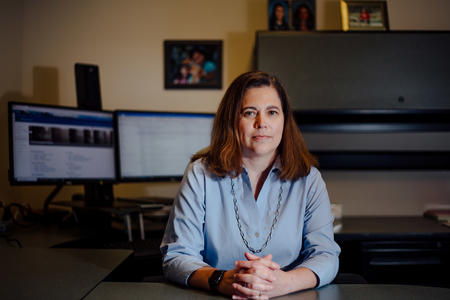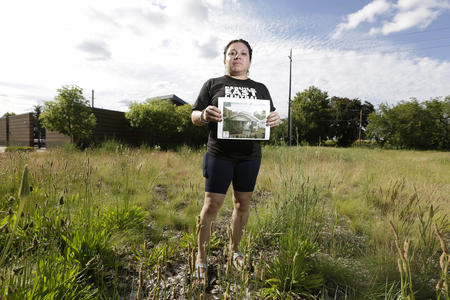The nonprofit has already depleted its cash for a deposit on the venue. Whether it can cover the rest hinges in part on a $3,500 grant promised back in April.
“We put on this festival every year for 11 years,” Thorsen said last week. “It’s in jeopardy now, if we don’t get the money.”
The DAIPANbutoh Collective is one of 86 small arts organizations in King County that have faced a months-long delay in funding from 4Culture’s Recovery Fund, a grant program funded by the American Rescue Plan Act that was meant to provide pandemic support for cultural organizations with a budget below $1 million. All 86 organizations applied in the fall of 2021, received an email in April 2022 notifying them that they had been awarded the money — and have been waiting ever since.
The hangup for getting the $2.2 million out to the grantees: An agreement between King County and 4Culture, a semi-public arts agency, to send out the federal grant money in batches of approximately 100 grantees. After 4Culture distributed $2.8 million worth of grants to 93 organizations in its “first batch” in June and $912,000 to 107 individual cultural producers, a few missing pieces of paperwork from grantees and a few uncashed checks created a dam effect.
“Any delays in funding are a combination of working with people and very tight federal regulations,” a 4Culture spokesperson wrote in an email. But the batching system wasn’t federally or legally required. It was an administrative decision. Since Crosscut’s inquiry into the batching system, 4Culture confirmed it has asked King County to "relax" the system and that funding should start going out to organizations as of last Friday, Sept. 2.
Update, Sept. 8: 4Culture officials stated payments had started going out Friday and multiple organizations have since confirmed with Crosscut that the money has appeared in their accounts.
“This is an urgent emergency,” said one local arts nonprofit leader who asked to remain anonymous. “We've had to stall on paying our bills, and our rent.”
During a phone call in late August, she said her organization was waiting on more than $20,000. Adding oil to the fire: She’s also waiting on ARPA funding from Seattle’s Office of Arts & Culture (ARTS), which she and other organizations applied for via the same application process. (ARTS told Crosscut verifying eligibility was creating a separate delay and that their $1.7 million in grants will go out this fall.)
This story is a part of Crosscut’s WA Recovery Watch, an investigative project tracking federal dollars in Washington state.
Many grant awardees who had not yet received the money told Crosscut they had other funding or donations tiding them over, but a number of organizations described impacts on programming or staffing.
One theater nonprofit said they would postpone their fall shows to spring 2023 while dipping into their reserves to pay for rent and insurance. A Seattle dance organization said it was holding off on hiring employees and expanding operations and programming. A local art space said they were holding off on ramping programming back up while they waited for the funds.
The delay comes at a bad time for some organizations, many of which are still trying to scale up programming as the pandemic wanes. But audience attendance remains well below pre-pandemic times. The continued drop in ticket revenue is particularly challenging for small nonprofits and independent art groups, who often operate close to the bone financially.
“We are still under the effects of COVID,” the anonymous arts leader said. “They are called recovery funds for a reason.”
4Culture officials said in August that the agency is not entirely responsible for the delay and pointed to the grantees and King County, who have to submit and check the documentation, respectively. “If a grantee falls behind our established timeline for submitting these documents,” the spokesperson wrote, “the process is held up until the document is submitted.”
In an interview, 4Culture deputy director Joshua Heim said 4Culture’s role as a pass-through agency for federal funding coming via King County made things extra challenging. This is in part because 4Culture doesn’t have enough money in the bank to advance millions in payments to organizations, meaning it has to request the money from King County. (4Culture’s contract with King County reserves $1.4 million of the $9.4 ARPA pot to administer the arts grant program.)
“It's unfortunate that this is the system,” Heim said. “But … the end of the day is not when the grant recipient receives their check. The end of the day is when King County and 4Culture go through a single federal audit.”
Sending out federal dollars also means there are more documents to request and more boxes to check, Heim said, adding that this process was unfamiliar for many of the grantees. (A few grantee organizations told Crosscut the process had been confusing, and that they had been asked for the same documents multiple times.) “We can only work as fast as we get that information from our grantees,” Heim said.
4Culture officials said each organization had to send in all of their documents and each individual grantee had to cash their (paper) checks in order to proceed with the next batch of awards, which meant a few people not cashing checks or filing required paperwork held up funding to dozens of other arts organizations.
When asked why awards went out in batches of about 100, a 4Culture spokesperson originally pointed to its contract with King County as the reason for not being able to process federal money on a rolling basis.
But it wasn’t in the contract. Rather, it stemmed from an administrative decision with King County’s Finance and Business Operations Division (FBOD), meant to expedite the process of collecting and reviewing the federally required documentation. The decision, a King County spokesperson said, was based on 4Culture’s internal capacity to carry out this work and designed to mitigate risk to King County, which has to double-check all of 4Culture’s information.
A few days after Crosscut inquired about the batching system, 4Culture submitted a request for “an advance payment” from King County, according to a King County spokesperson. Once they did, it took the county’s business operations department two weeks to review and approve the funding.
“Once we understood the problem with these paper checks,” Heim said, “we are communicating with [King County] … like: ‘Hey, can we work on this?’ Because obviously it’s not working, and neither of us would have anticipated this.”
Find tools and resources in Crosscut’s Follow the Funds guide to track down federal recovery spending in your community.
One thing 4Culture administrators hope to do differently when they send out another round of Recovery Fund grants for individuals in 2023: no more paper checks. The idea was that those would be easier to work with than direct deposits, but they instead helped create congestion. “Well, here we are. And who knew?” Heim said.
4Culture spokesperson Christina DePaolo added that the agency is also hoping to change the documentation process for individuals. The requirement to show financial loss through tax forms – “a huge pain for them and for us,” per DePaolo – will potentially change.
“We are currently working with King County to build the program to be simpler and easier,” DePaolo said. “We learned our lesson from the first round and are applying them to the next.”
DePaolo added that if 4Culture were to get federal funds again, the agency would work with King County to identify better options such as a rolling payment process.
“I mean, this is the first time that we have been a pass-through agency for federal funds,” Heim said. “4Culture’s learning — we're always learning.”
Despite the delays, Thorsen of DAIPANButoh remained hopeful the money to support this year’s November festival would work out.
“I have faith it’s going to come through,” she said. “I have faith in 4Culture.”
Get the latest in local arts and culture
This weekly newsletter brings arts news and cultural events straight to your inbox.






